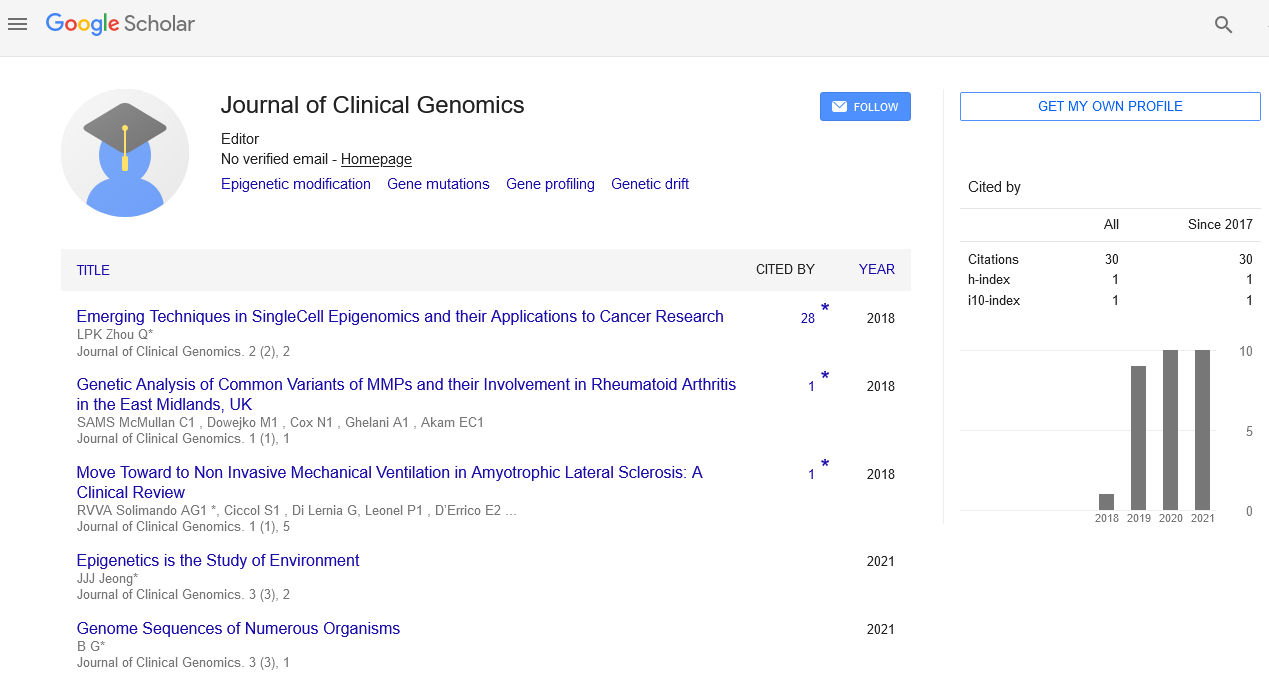Perspective, J Clin Genom Vol: 5 Issue: 1
Exploring Human Genome Using Whole Exome Sequencing
Igor Selezneva*
Department of Gynecology, Beijing Obstetrics and Gynecology Hospital, Capital Medical University, Chaoyang, Beijing, China
*Corresponding Author: Igor Selezneva Department of Gynecology, Beijing Obstetrics and Gynecology Hospital, Capital Medical University, Chaoyang, Beijing, China; E-mail: igorsele@cmu.com
Received date: 03 February, 2023, Manuscript No. JCG-23-93462;
Editor assigned date: 07 February, 2023, PreQC No. JCG-23-93462 (PQ);
Reviewed date: 21 February, 2023, QC No. JCG-23-93462;
Revised date: 28 February, 2023, Manuscript No. JCG-23-93462 (R);
Published date: 07 March, 2023, DOI: 10.4172/JCG.1000118
Citation: Selezneva I (2023) Exploring Human Genome Using Whole Exome Sequencing. J Clin Genom 5:1.
Description
The human genome is a complex system of Deoxyribonucleic Acid (DNA) that contains the genetic instructions for the development, function, and regulation of all living organisms. In recent years, advances in technology have allowed us to explore the genome with greater precision and depth than ever before. One of the most powerful tools in this effort is Whole Exome Sequencing (WES), which allows us to examine the entire protein-coding region of the genome.
WES is a technique that allows scientists to examine the exome, or protein-coding region of the human genome. This region contains about 1-2% of the total genome, but it contains the majority of known disease-causing mutations. By sequencing this region, researchers can identify variations that may be responsible for genetic diseases or that may have implications for health and disease risk.
Advantages of WES
One of the primary advantages of WES is that it is a cost-effective way to sequence a large portion of the genome. While sequencing the entire genome is still prohibitively expensive for most researchers, WES is relatively affordable and can provide a wealth of information about the genetic code. Additionally, because the exome contains most of the disease-causing mutations, WES is a powerful tool for identifying the genetic basis of rare diseases.
Applications in clinical research
WES has numerous applications in clinical research, particularly in the identification of genetic mutations that may be responsible for rare or inherited diseases. For example, WES has been used to identify mutations in genes associated with cancer, autism, and other genetic disorders. This information can be used to develop new treatments, understand disease mechanisms, and identify patients who may be at risk for developing certain diseases.
Another application of WES in clinical research is in the identification of pharmacogenomic markers. Pharmacogenomics is the study of how an individual's genetic makeup affects their response to drugs. By examining the exome, researchers can identify genetic variations that may impact drug metabolism or efficacy. This information can be used to develop personalized medicine approaches that can improve patient outcomes and reduce the risk of adverse drug reactions.
Future of WES
As the cost of sequencing continues to decrease, we can expect to see even greater use of WES in both research and clinical settings. In particular, WES is likely to become an important tool in the development of personalized medicine approaches, where treatments are tailored to an individual's genetic makeup. This approach has the potential to revolutionize medicine and improve outcomes for patients with a wide range of diseases.
Conclusion
Whole exome sequencing is a powerful tool for exploring the human genome and identifying genetic variations that may be responsible for disease or that may have implications for health and disease risk. By sequencing the exome, researchers can gain valuable insights into the genetic basis of disease and develop new treatments and approaches to personalized medicine. As the technology continues to evolve, we can expect to see even greater use of WES in both research and clinical settings, with the potential to transform the way we approach healthcare and disease management.
 Spanish
Spanish  Chinese
Chinese  Russian
Russian  German
German  French
French  Japanese
Japanese  Portuguese
Portuguese  Hindi
Hindi 